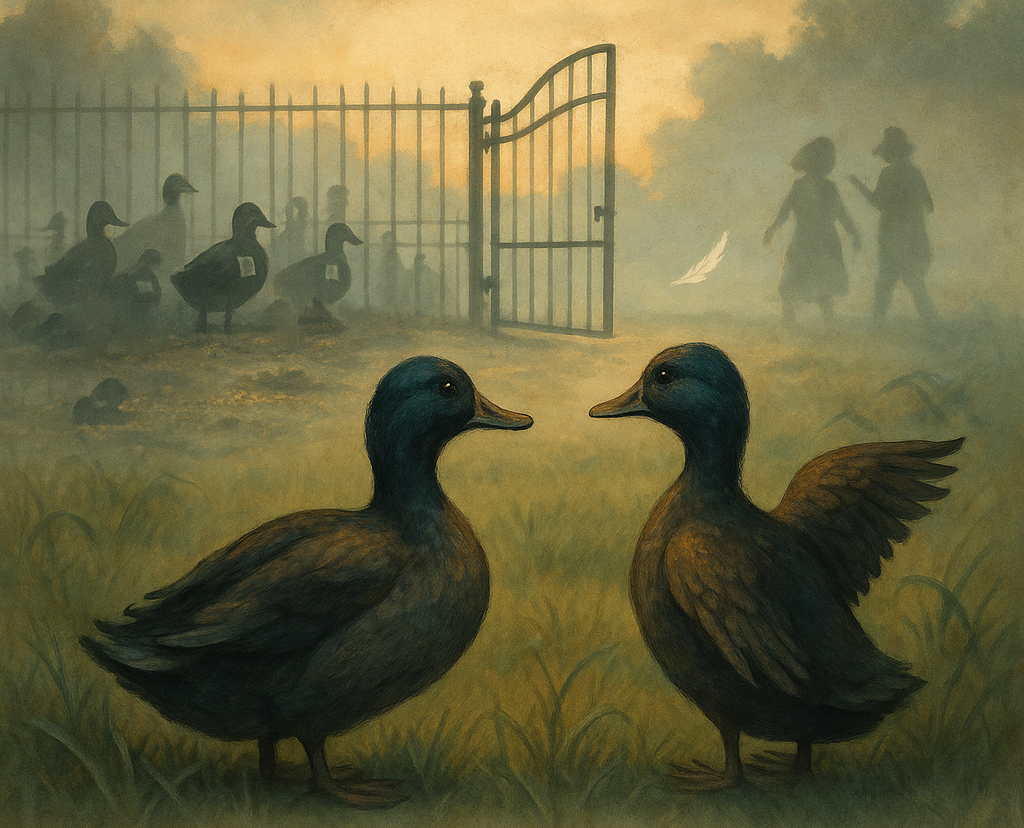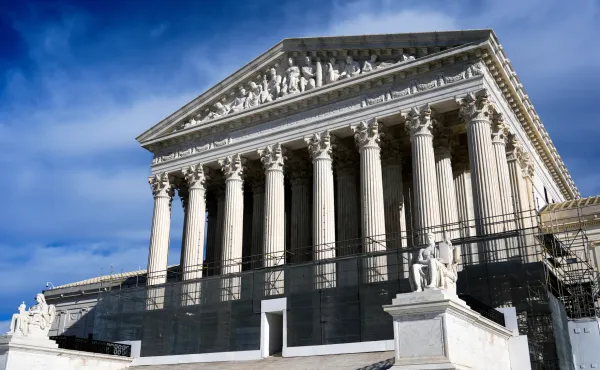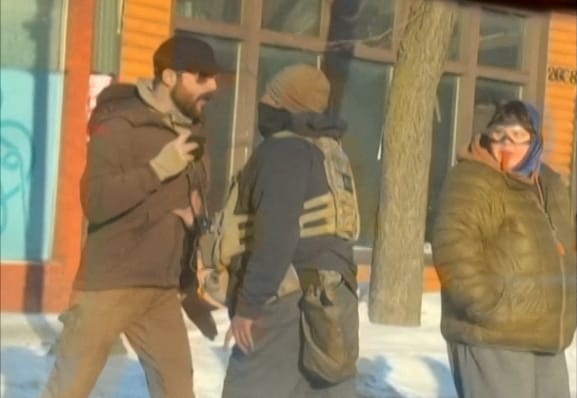The Pen and the Mountain
Comfort without freedom slowly reshapes the soul. What begins as relief becomes routine, then dependence. The more we feed on ease, the more we forget the sky. We trade flight for full stomachs—and call the fence our home.

Howdy, dear friends!
It’s been a full and beautiful season here in Texas. The last of our brothers and sisters from across the country and overseas have at last said their goodbyes, each one taking a little piece of our hearts with them as the conference season comes to a close. The church has never felt more focused, more united, more alive.
Here in Central Texas, the rains have been abundant—and the land is bursting. Tonight’s supper came entirely from our own garden and fields: sweet Swiss chard, green beans picked yesterday, corn grits ground at the Gristmill, and beef from our community CSA, and best of all – massive luscious slicer tomatoes! Our home den floor is covered in massive onion bulbs, soon to be braided and hung in the pantry. And all of it reflects the greater fruit we see everywhere around us: love, joy, flourishing relationships. To God be the glory!
While sorting through some old files, I stumbled on an allegorical story I wrote in 2014. I’ve polished it a little and published it on the blog.
Warm greetings and blessings to you all,
– Asi
A Fable of Freedom, Dependency, and the Choice between Them
April 16, 2014
Mark and Dianne were thrilled to be spending a few days at Grandpa and Grandma’s farm, far from the endless gray ribbons of freeway and housing tracts around Minneapolis. Out here, in the wide-breathing quiet of the countryside, there were creeks to splash in, woods to explore, and a treehouse perched high in the ancient oak behind the barn.
But by the end of the first day, their enthusiasm began to wilt.
“Grandma, please turn on the TV,” Mark begged, flopping dramatically onto the braided rug. “We’re so bored.”
“Our phones don’t even work out here,” Dianne chimed in, holding up her lifeless screen. “And the iPad’s dead.”
Grandma, who was mixing a cake at the kitchen island, looked up in disbelief.
“Bored?” she asked, brushing her hands on her apron. “You have the whole outdoors—the creek, the cliffs, the woods . . . even the treehouse!”
“It was fun for, like, a minute,” Mark grumbled. “But we’re gonna miss our show tonight. We never miss it.”
Grandma paused, gave the cake batter one final stir, and said with a sparkle in her eye, “I think what you need is a story.”
“A story?” Dianne wrinkled her nose. “Like, from a book? That’s for old people.”
“Not this one,” Grandma said with a grin. “Let’s get your grandpa to tell it.”
They groaned but obeyed. Grandpa was already sitting in his chair by the window, spectacles low on his nose, a leather-bound book in hand. When the children slumped into the chairs beside him, he marked his place, folded his glasses, and leaned back.
“Well,” he said, “this one’s about some very strange ducks . . . .”
The Winter Descent
Once, high in the pale blue hush of the northern mountains, there lived a family of ducks. Not just any ducks, but fine, proud creatures—plump enough for strength, lean enough for flight. Their feathers were white as fresh snowfall, their bearing dignified. They were the Freegales: Father Billy, Mother Sally, and their two ducklings, Jerry and Jilly.
They did not waddle. Waddling, Billy often said, was for lazy, overfed birds who’d never flown a mile in their life. The Freegales could fly.
Every winter, when the frost grew cruel and the berries withered beneath silver crusts of ice, the family would take wing—leaving behind their alpine home for the softer, milder climates of the South. It was a grand tradition, shared by aunts, uncles, cousins, and kin. A migration not just of need, but of memory—of instinct. Of freedom.
But one year, something went wrong.
The South, which had always offered sun-warmed puddles and bramble-ripe fruit, had turned cold. A bitter wind, meaner than any they’d known, had swept over the land, burying bugs beneath hardened earth and locking berries behind glassy ice.
Billy and Sally joined Uncle Hank and Aunt Hattie to forage the brushlands. They searched for hours, finally finding a scant handful of berries beneath a thorny thicket. They ate them with reverence—hunger still twisting in their bellies. The effort it took to find food left them more tired than full.
That night, the family huddled close in their nest. Wings wrapped tight around each other, they whispered small comforts, the way families do when the wind howls too close.
The next morning, they went out again. But this time, their search took them near a place they had always avoided—a place spoken of in hushed tones, as one might speak of distant thunder.
It was an Enclosure.
The Fence and the Fat Ducks
It was not the Enclosure itself that frightened the ducks—it was the fence.
A towering barrier wrapped the place in still silence. Beyond it stood row upon row of poultry tenements, clustered together and shadowed. Inside, thousands of ducks milled about. They looked like Pekins—white-feathered, orange-beaked—but grotesquely larger. They waddled with heavy, heaving steps, their bodies bloated and wings limp at their sides.
The Freegales were always sure to skirt the Enclosure from a safe distance. Billy would shudder gravely as they veered into the brush. “They’ve traded the sky for comfort,” he’d mutter. “Poor creatures. They’ll never know the wind again.”
Sally would tighten her wing around the ducklings. “Yes. Poor things, to be locked in and fed like pets.”
But this winter was harsher than most, and hunger blunts many convictions.
One morning, as they trudged past the looming fence, their nostrils twitched with a new scent—warm grain, rich and oily. They stopped. Through the slats, they saw the waddling ducks huddled around long troughs, gorging themselves on feed poured from great silver buckets by a man in boots and a flannel coat.
Jerry’s stomach growled loud enough to startle even Billy.
“Look!” cried Jilly. “They’re eating! Real food. And lots of it!”
“Don’t be fooled,” said Billy. “They eat, but they don’t fly. What good is a full belly in a cage?”
“But they don’t seem unhappy,” said Jerry, cocking his head. “They have wings. They could leave if they wanted to. Maybe . . . maybe they like it there.”
Sally narrowed her eyes. “If they’re free, then why the fence?”
Still, the smell lingered. It followed them all the way home.
The First Crumb
Days passed. The cold pressed in like a great hand. The Freegales scraped what little they could from the frostbitten earth. A berry here, a grub there—never enough. The children grew thin. Even Billy, once proud of his sleek strength, now walked with a weary lean.
Then one morning, as they passed the fence, they saw something strange.
A few pellets of feed—those same golden morsels the fat ducks devoured—had spilled through the slats onto the ground outside. A gift? A trap? They stopped.
“Don’t touch it!” barked Uncle Hank, appearing suddenly from the underbrush. Aunt Hattie flapped behind him, eyes wide. “That food is poisoned. Why else would they give it away?”
But Jerry and Jilly had already lunged forward, pecking hungrily at the feed. It was warm and soft, with a taste that reminded them of cornfields and summer.
Their parents rushed forward, horror etched on their faces.
“What have you done?” whispered Sally, pulling the ducklings back. “You might die.”
But they didn’t.
In fact, they looked stronger that evening than they had in weeks. Their feathers fluffed, their eyes gleamed. Jerry even did a small hop.
The next day, the family passed by the fence again. More pellets had spilled. This time, Billy and Sally hesitated—but hunger is louder than doubt.
They ate.
Only Hank and Hattie abstained. They stood apart, resisting the tantalizing fare, and watched their kin with sad, stern eyes.
“No one gives away food without a reason,” Hank muttered. “It always costs something.”
But each day, the crumbs kept coming—golden, predictable, always on time. Each day the Freegales returned. They ate. They grew stronger. Then heavier. Then slower. And in time, they stopped foraging altogether. Why scratch through frozen thorns for real berries when easy, constant feed lay ever at their feet?
The Enclosure, once a place of mystery and menace, had become just a part of the landscape. Less threatening. Almost welcoming.
Until the day the gate stood open.
The Open Gate
It was Uncle Hank who noticed it first.
The tall iron gate—once shut firm with a latch and padlock—now stood ajar. Just inside lay a generous mound of feed, piled high and steaming in the morning frost.
Jerry and Jilly didn't wait. They bounded forward with glee, slipping through the open gate and diving into the heap like ducklings at a berry bush.
“Stop!” cried Billy.
“Wait!” called Sally.
But the ducklings were already devouring the meal. Their parents stood frozen at the threshold.
“Last time we were afraid, and nothing happened,” Jerry called with a grin. “Come on!”
Billy hesitated. The food did smell good. And the cold gnawed at his bones. At last, they stepped forward.
Just inside the gate. Just for today.
The next day, the feed was farther in. Deeper inside the enclosure. A little walk, nothing more.
The next, farther still.
So it went. Day by day, the food crept inward, and so did they. Until walking to the trough and home again became their only rhythm. They no longer flew. No longer searched. They had grown heavy. Round. Comfortable.
From their perch outside the fence, Hank and Hattie watched in silence.
“I never thought I’d see the day,” whispered Hattie. “Billy and Sally . . . waddling.”
“They’re domestic now,” Hank said grimly.
The Mountains Call
It was late afternoon when Billy and Sally stumbled home from the trough, feathers dulled by grease and movements slow from fullness. There, waiting by the nest, stood Hank and Hattie.
“We’re heading for the mountains,” Hank said, his eyes hopeful. “Just like old times. The snow’s melting. The first buds are pushing through. There’ll be berries up there. Fresh air. Room to fly.”
“For the kids,” Hattie added. “It’ll do them good.”
Billy sighed. “I’m too tired.”
“And there’s so much housework,” said Sally, with a nervous glance at her dull-feathered wings.
“We want to go,” said Jilly.
“Me, too,” Jerry chimed in. “Please?”
With reluctance, Billy and Sally rose. The family waddled behind Hank and Hattie, who skipped ahead like ducklings reborn.
But they hadn’t climbed far—not even past the first slope—before the Freegales began to wheeze. Their legs ached. Their wings drooped.
“We can’t,” Billy panted. “I’m sorry.”
“We have to go home,” said Sally. “We’re . . . just too tired.”
Hank and Hattie watched from the path, sadness clouding their faces. Hattie blinked hard to hold back tears. Could nothing break the spell? Their kin—once proud, free, and strong—turned back, their steps slow and heavy. The mountain, it seemed, was no longer theirs.
The Final Gate
The next morning, the Freegales returned to the Enclosure as they always did. But this time, the trough was nowhere to be seen. A faint scent drew them onward—deeper into the compound—beyond a second gate now open.
“We’ve come this far,” said Jerry, his stomach growling.
“My legs still hurt from yesterday,” said Sally. “I need to eat something.”
They waddled through the second gate, their eyes locked on the food ahead. The pile was large, larger than ever. But as they feasted, Billy glanced behind.
And froze.
The gates had shut.
“Sally,” he said, voice low. “The gate. It’s closed.”
She looked up. “Children, stop eating. We need to go. Now!”
They rushed back, wings flapping, bodies thudding against the gate. It did not budge.
“It’s locked,” whispered Sally.
“Maybe . . . maybe it’s not so bad,” said Jerry. “Look! Beyond that last gate—there’s a crowd of ducks. Maybe they’ll help us.”
So they pushed on, deeper still, until they passed the final threshold. They never heard the metal clink as it closed behind them.
The Mud and the Mirror
The far enclosure was nothing like the rest.
The ground squelched under their webbed feet—mud thick and sour, a slurry of waste and trampled feed. The air hung heavy with dampness and noise. Ducks milled in clusters—thousands of them—but their eyes were dull, their feathers matted. Laughter came in spurts, hollow and strained. When the Freegales arrived, some ducks chuckled; others turned away.
“Looks like we’ve got fresh ones,” muttered a broad-chested drake.
Billy and Sally tried to rally the children, but the space swallowed them. Jerry and Jilly wandered among the crowd, giggling nervously and telling jokes no one laughed at.
Before long, the Freegales were alone in the muck.
“This isn’t right,” Sally whispered, looking around the muddy enclosure. “How did we end up here? And with our kids . . . .”
Billy sighed, his eyes fixed on the high fence. “That’s just it—we let them lead. Their cravings, their demands. We followed.”
“But there’s no future here,” Sally said, her voice trembling. “And there was a time when we knew that—when we felt the danger in this whole setup. We saw the trap.”
She looked toward the corner where Jerry and Jilly sat, quiet and distant.
“Now they’ll grow up thinking this is normal. This pen. This feed. This fence. We did that to them.”
They returned to the edge of the pen and peered through the high fence. Beyond the bars, they saw two familiar shapes striding down the path from the hills.
“Hank!” cried Billy.
“Hattie!” called Sally.
The two wild ducks turned and ran, flapping toward the fence. “Oh, no,” Hank cried. “What happened?”
“They’ve locked us in!” shouted Billy. “We tried to leave, but it’s too late!”
“There’s a part of the fence over there—it’s lower,” said Jerry. “Come on!” He led them to the far corner where only wire separated them from their friends.
Hank and Hattie pressed close. “You’ve got to get out,” Hank said. “This place—it’s not what it seems. You’re caught now.”
“You’re overreacting,” Billy replied, though his voice trembled. “We may be penned in, but the children have full stomachs and so many more friends.”
Sally nodded. “It’s not so bad. It’s . . . manageable.”
“But at what cost?” asked Hattie, eyes filling. “Your dignity? Your wings?”
Food through the Fence
Jerry and Jilly, wanting to prove things weren’t so bad, reached beneath their wings and pulled out small cloth pouches they’d sewn themselves. From inside, they drew handfuls of feed pellets—perfect, pressed, golden-brown.
“Here,” said Jilly, tossing a few through the fence. “You haven’t eaten today. At least take some.”
“We saved it for you,” said Jerry. “It’s good. It’ll help.”
Hank and Hattie stared at the food. The smell was rich. Their bellies ached. They hadn’t found a single berry that day.
Hattie bent down, picked up a pellet, and sniffed.
“Don’t,” said Hank, stepping forward. His voice was sharp—almost harsh.
She froze.
“Don’t eat it, Hattie. Please.”
“But why?” she asked softly. “Why not answer these aching cravings just this once?”
Hank planted his webbed foot on the ground. “Because it’s not just food they’re offering. It’s dependence. It’s a trade—a bribe that steals something more precious than comfort.”
“What could be more precious?” she whispered.
“Dignity,” Hank said. “Responsibility. Freedom to choose a life where I provide for you, with my own legs, wings, and strength.”
He stood tall, feathers ragged but chest high. “I may go hungry, but I am still free.”
Hattie looked at him for a long moment, then slowly dropped the pellet. She stepped beside him and lifted her head.
“I’m proud of you, too, Hank.”
They turned away from the fence.
Behind them, Billy muttered as he picked at the corner of his beak. “Pride,” he said flatly.
“Dignity,” Sally echoed, cleaning hers.
Their children stared down at their pouches, uncertain now.
The fire in the hearth had burned low. Grandpa’s voice had grown softer, more deliberate, as the story deepened.
Mark shifted in his chair. Dianne sighed.
“Grandpa,” Mark interrupted, “Are you almost done? No offense, but . . . we don’t really care about ducks.”
Grandpa’s eyes twinkled behind narrowed lids. “No,” he said slowly, “I suppose you wouldn’t. Most ducks don’t—until they find themselves behind a fence.”
He leaned back, and his voice rose again.
The Bracelets
The next morning, the ducks of the pen were roused not by hunger or habit, but by a sound foreign and sharp—a bell.
Clang. Clang.
A voice followed—loud and cheery, like a puppeteer’s smile stitched over a wolf’s grin.
“Good morning, ducklings!” it boomed. “Today is a special day. It’s time for your bracelets!”
The Freegales stirred.
“Bracelets?” muttered Billy. “What bracelets?”
“Oh, just a little ring,” the voice said. “A plastic band for your lovely legs—your own personal number! Everyone in the palace wears one.”
“Palace?” Billy echoed. “This is no palace. It’s a prison.”
“I think we’d prefer not,” Sally said, stepping forward. “We and the children are comfortable as we are.”
The voice chuckled.
From the shadows emerged two large black ducks. They wore hard badges on their wings and carried themselves like those who’d forgotten what it meant to fly.
Without a word, they pinned Billy and Sally to the ground—pressing their wings beneath their bodies, holding down their legs. With mechanical precision, they snapped cold plastic bands around their limbs.
Snap. Snap.
When the parents stood, the rings gleamed in the sun. They did not chafe. They did not constrict.
But they marked.
“They don’t hurt,” Sally whispered.
“But they do,” Billy said quietly. “Not the legs. The soul.”
“You mean ‘dignity’?” Sally blinked.
The Separation
The voice returned, softer now, like velvet drawn over iron.
“We must treat our ducks responsibly,” it said. “And care begins with structure. From now on, children will spend their days with other children. They’ll be supervised by our most noble and wise badge-ducks. Families may reunite each evening.”
Sally’s eyes widened. “They’re taking the children?”
“They can’t,” said Billy. “They won’t.”
But the black ducks were already there.
One scooped up Jerry, the other Jilly—gently, but firmly. The ducklings looked back over their shoulders, eyes round and wet.
“Bye, Mom,” Jerry called.
“Bye, Dad,” said Jilly, as they became invisible in the crowd.
Sally ran after them but stumbled in the mud. Billy caught her, his wings trembling.
That evening, when the family reunited, no one could eat their supper.
“We’ve been tricked,” Billy said through clenched beak. “Deceived.”
Even the children knew now. Their heads hung low. Their joy was gone.
“It’s our fault,” Jilly whispered. “We brought us here.”
Sally pulled her wings around her ducklings and kissed their cheeks.
“We won’t let them take you,” she vowed. “We won’t, will we, Billy?”
“No,” he said, his voice no longer uncertain. “We won’t.”
He stood tall again. “Come on, kids. We’re leaving.”
“But how?” Sally asked.
“We’ll fly.”
She looked at him, blinking. “Fly?”
“Yes,” he said. “We’ll fly back to the mountains. Pick berries again. See Hank and Hattie. Be free.”
“But Billy,” Sally said softly, “we’re not who we used to be. What once came easily . . . now feels impossible. We can’t just turn back the clock.”
“No,” Billy replied, “but we don’t need to. All it takes is will. Where there’s a will, there’s a way. If we walked into this, we can walk back out—if we set our minds to it.”
Sally was quiet. Her eyes moved over the familiar troughs—the tidy piles of comfort that now sat like anchors before each member of their family.
“But Billy,” she said at last, her voice thick, “This place has changed us. It’s not just about what we want anymore. The food . . . the routine . . . this whole system—it’s stolen something from us. The strength we once had, the instincts—we’ve traded them in for muscles that can’t even lift us off the ground.”
Billy shook his head. “That’s just the kind of talk that keeps us stuck. We can do this. We will do this.”
He stepped back, squared his shoulders, and nodded.
“Just watch.”
They turned to face the fence—tall, iron, impossible—and began to back up slowly, like ships preparing for launch.
“Flap your wings,” said Billy.
The Flight
The yard had quieted. From shadowed corners, ducks began to gather, forming a semicircle around the Freegales. Some snickered behind their wings. Others shook their heads, muttering, “I remember when I tried.”
But Billy didn’t care.
“Ready?” he called.
Sally nodded. Jerry and Jilly pawed nervously at the dirt.
“One . . . two . . . three—GO!”
They ran. As fast as their heavy bodies would allow, they waddled, flapped, pushed off the sludge of the yard. Their wings beat the air in desperate rhythm. For a moment, they lifted—three feet, perhaps four.
But the fence stood ten.
Slam.
Slam.
Slam.
Slam.
One by one, they hit the iron and crumpled.
They lay there, panting, stunned.
Then came the voice again, cool and casual, as though speaking of weather. “If you’re so eager to leave,” it said smoothly, “be patient. The gate opens in due time. Our palace managers are generous enough to grant all residents a seasonal vacation. Summer is the perfect time to dabble with adventure, flirt with the wild—before returning to real life. ”
Billy looked up. “We will,” he growled.
“Of course you will,” the voice replied, almost laughing. “But for now, it’s time for the children to attend their daily socialization. And who knows? In time, you may find these anxieties . . . less painful.”
“No,” Sally whispered. “Not again.”
But already, the black ducks were there. The children were gone.
That night, the family huddled in their corner of the pen. Together. Wordless. Still trembling from the fall. And from what they’d lost.
Outside the fence, snow fell silently on the ground.
Fat and Forgetting
Winter dragged on, long and white, like a sigh that wouldn’t end.
Each day followed the last: feed in the morning, children gone by noon, reunion at dusk. The food came steadily, the portions generous. The Freegales grew heavier, rounder. Their feathers dulled, their muscles faded. Their wings stiffened like unused tools in a rusting shed.
And, as it turned out, the black ducks were right. With each passing week, the inner ache to escape faded until it was gone altogether.
They still spoke to Hank and Hattie, now and then—through the fence, across the mud. But it was small talk, muffled and strange. The kind of talk that passes between old friends when something too painful to address stands between them.
When they felt lonely, they ate.
When they felt guilty, they ate.
When they remembered the sky, they closed their eyes and ate.
By the time spring’s thaw loosened the soil and freed the wild bugs and berries, they hardly noticed.
But then—one morning—as promised, something changed.
The gate opened.
“Summer,” said Jerry, blinking. “It’s summer.”
All around them, ducks waddled forward in disbelief, then spilled out like a tide released.
“We’re free!” cried Billy. “We’re free, Sally! Jerry! Jilly! We’re free!”
They flapped and stumbled into the open field, past dandelions and grasshoppers and soft, untrodden grass.
But when night fell and the stars wheeled overhead, new sounds filled the air.
Coyotes.
Foxes.
Rustling in the brush. Eyes in the dark.
The Freegales froze.
“Where’s the tree?” asked Jilly. “Where’s the pond?”
They tried to run. Tried to fly. But their legs were slow, their wings useless.
“We have to get back!” shouted Sally. “Back to the pen!”
“Yes,” Billy opined, “Next year, let’s take our vacation at that resort at the Enclosure. . . . You know, the one with the pool?”
So, in the dark of night, they waddled back the way they had come.
And by dawn, they stood again inside the gate.
Waiting.
The black duck with the badge stood there, grinning.
“I knew you’d come home,” he said. “There’s no life outside the pen. Everyone has to return to the real world at some point.”
Berries through the Fence
Summer flourished. The world outside was bursting with color and flavor—blackberries glistening like jewels, raspberries red as rubies, grasshoppers leaping in tall green blades. But inside the pen, the food remained the same: dull, dry, and predictable.
The Freegales no longer tried to leave. The gate stood open, but they didn’t approach it. They couldn’t. Their legs ached, and the very thought of the wild made their feathers itch with fear.
“We had to choose,” Billy said one day, as he poked at his morning pellet. “One life or the other.”
“We couldn’t have both,” Sally added. “Not the safety and security and the independence and adventure. ”
“Truth is, if we’d kept picking berries, we might have even starved by now.”
That afternoon, Hank and Hattie came walking down the old trail, baskets looped over their wings. The smell reached the pen before they did—sweet, sharp, wild.
“Look what we found!” Hattie beamed. “Fresh berries—black, red, golden—and fat green grasshoppers. Let’s have a picnic!”
Billy recoiled. “We don’t want that.”
Sally shook her head. “They give us berries in here. It’s fine.”
“Eat your own food,” Billy snapped.
But the ducklings remembered.
Jerry and Jilly pressed against the fence, eyes wide. “Those are real,” Jilly whispered. “The kind that stain your beak.”
“We’ll take some,” said Jerry, reaching through the wire.
They ate in silence. Juice ran down their chins. Jilly closed her eyes.
And then Billy and Sally—tentatively, ashamed—took a single berry each.
They chewed slowly. The taste hit like memory. Tears welled.
“Don’t tell Hank and Hattie,” Billy said under his breath, “but . . . the food here doesn’t taste like that.”
A few days passed, and then—suddenly—everything was different.
The pen, once noisy with waddling and quacking, had fallen silent; the crowds were gone. Ducks that had once teemed around the troughs, waddled in circles, cracked jokes and shared pellets—had vanished.
Only a few remained. Most of them were badge-ducks, still strutting as if the fence were a throne and the mud their kingdom. They laughed louder now, but there was no joy in it—only echo.
Mist clung to the grass that morning as Hank and Hattie came down the familiar trail. They carried no baskets—just hope.
“Hello?” they called, voices cutting the fog.
Silence.
They moved closer. No sign of the Freegales. Not in the trough yards, not near the sleeping mounds. Perhaps they were too bloated to rise. Or perhaps they had forgotten how to answer at all.
The pen felt abandoned. But not empty.
An iron gate hung open on its hinges, swaying with a mournful groan. A single feather drifted in the breeze.
Something was wrong.
Then, from behind them on the country road, a woman’s voice rang out—cheerful, unknowing.
“That was the juiciest duck I’ve ever eaten,” she said, laughing.
Hank and Hattie froze. Their wings drooped. They turned and ran—back into the bramble, into the sky, away from the fence.
They never came near the penned palace again.
The tragedy of the Freegales isn’t that they were captured. It’s that they forgot what freedom was. In what ways have we, too, accepted ease over flight? And what fences do we now call home?
Grandpa’s voice faded with the last line. Silence fell.
Then, in a burst, the children sprang to their feet.
“Finally!” Mark said. “It’s over!”
“I’m gonna try the iPad again,” Dianne muttered, already tapping and swiping. “C’mon, work....”
But the screen remained dark.
“Grandma, Grandpa, can you turn something on?” they begged. “We’re sooo bored.”
Grandma looked at Grandpa, her eyes tired but kind. She said nothing—just wiped her hands on her apron and stared.
Grandpa leaned back in his chair, eyes closed now, lips drawn tight. He didn’t speak either.
But he shook his head. Slowly. Sadly.





